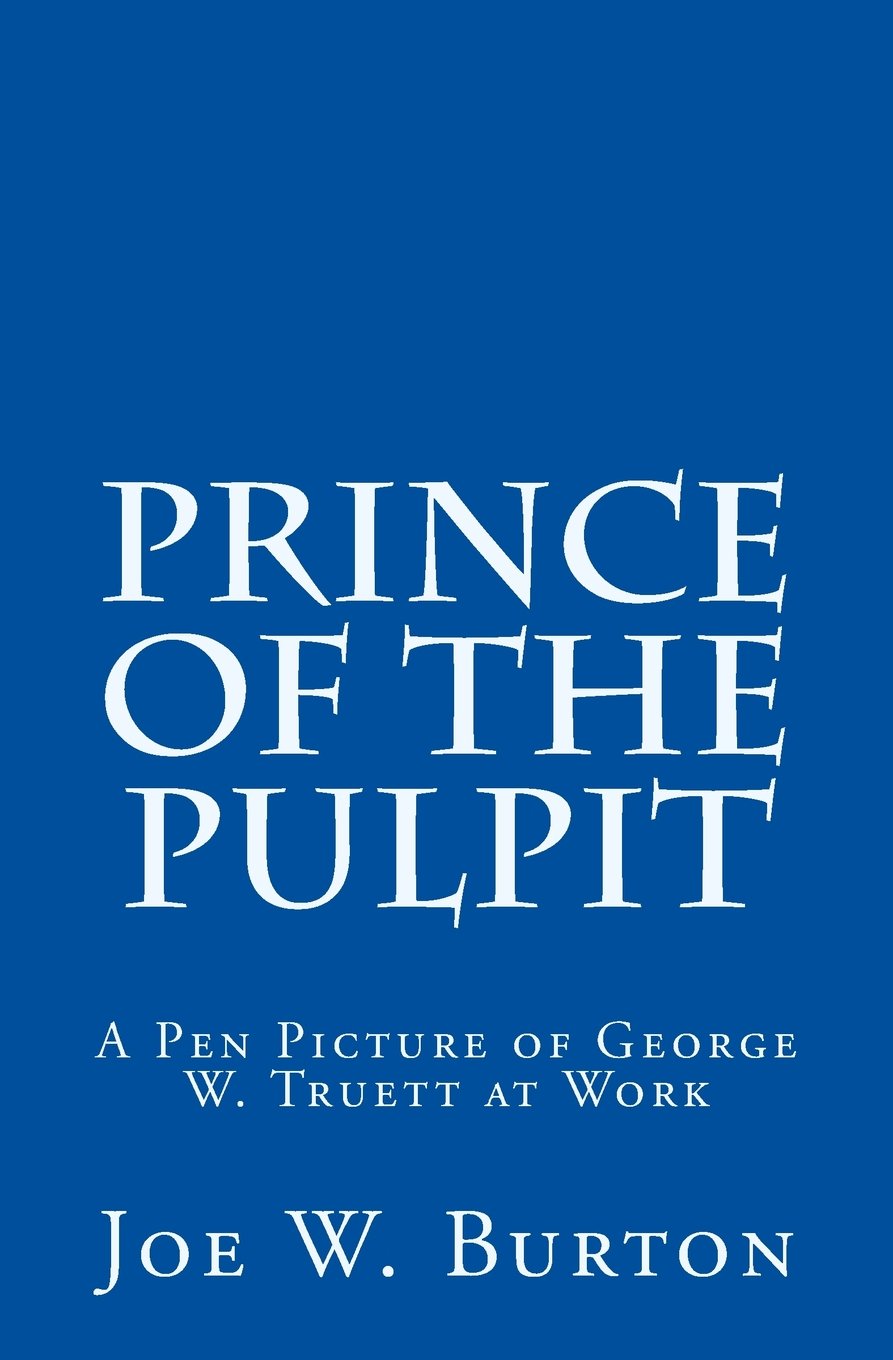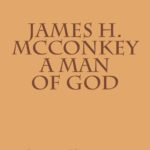Description
PRINCE OF THE PULPIT
A Pen Picture of George W. Truett at Work
by
JOE W. BURTON
Home Curriculum Editor, Sunday School Board Southern Baptist Convention Atlanta, Georgia
2015
- PREACHING THE WORD
- THE PREACHER IN HIS STUDY
- THE PREACHER AND HIS APPOINTMENTS
- HELPING THE TROUBLED
- AFLAME FOR SOULS
- THE PREACHER AND MISSIONS
Dedicated
to the memory of
Dr. George W. Truett
whose life and ministry meant much to the
spiritual growth of contemporary Christendom
and whose great compassion shall
linger in the lives of those he loved with
the tenderness and compassion of
the God he served.
FOREWORD
These sketches were first written as a contemporary pen picture of the ministry of the greatest modern preacher. Their composition was in September, 1941, following the completion of the forty-fourth year of Dr. Truett’s pastorate in Dallas, the articles appearing serially at the time in “Southern Baptist Home Missions.”
Since Dr. Truett’s death, July 7, 1944, the material has been revised and brought up to date.
The example of Dr. Truett’s prodigious ministry, one must feel, will ever be an inspiration to evangelical Christendom. His diligence in business, his earnestness of purpose, and his fervency of spirit will always challenge preachers to give their best to the Gospel.
In the hope of capturing on paper something of the magnanimity of his spirit these pages were written. If through their reading anyone should experience a new devotion to the Saviour’s service, our mission will have been accomplished.
Joe W. Burton
ATLANTA, GEORGIA
1. PREACHING THE WORD
I attended the anniversary services of Dr. George W. Truett when he had completed forty-four years as pastor of the First Baptist Church in Dallas, but there was no recital of the marvelous progress of the church under his ministry, no statistical report of the additions or of the fabulous offerings made, no testimonials from any who were there that second Sunday in September, 1897, when Dr. Truett assumed the pastorate, not even the reading of congratulations which came by telegraph, by mail, by telephone from all over the nation.
The absence of the fanfare is typical of the man whose anniversary was celebrated, and the reason for its absence is perhaps the explanation of his amazing pastorate of nearly a half century – a pastorate which, according to a tabulation by Dr. E. P. Alldredge, had seen at the end of forty-five years 5,050 baptisms, or an average of 112 a year, and total contributions of $5,348,245.92, or an average of $118,851.02 per year.
Straight into the pulpit Dr. Truett strode promptly at eleven o’clock. Behind him came his assistant since 1904, Robert H. Coleman. The audience which had been gathering for an hour and now filled the immense auditorium stood for the doxology at Dr. Truett’s signal.
The pastor’s invocation and later his morning prayer, even his calling of the hymns and making of two brief announcements, betokened the single serious purpose of the great anniversary convocation. It was evident to all that according to the interpretation of the man who led the worship the one object of the service had nothing to do with giving glory to any man.
“Let us,” he prayed, “give our best to Christ.”
That, in his mind, was the purpose of the service, the object of his whole ministry, and the preacher’s challenge to his 7,500 members at the beginning of his forty-fifth year.
Dr. Truett entered the pulpit with his right thumb bandaged. He had suffered a deep cut when he jammed an electric fan just before time for service. But no one noticed the bandage, except a few who sat nearest the speaker.
The preacher kept his right hand at his back, on the pulpit, or in his pocket. Most of his few gestures were with his left hand. It seemed to be a studied avoidance of exposing to view the injured thumb.
With a rare sensitiveness to the pitfall of putting himself forward, even by displaying a sore thumb, Dr. Truett guardedly hid himself in order to give his “best to Christ.” It was the lifelong practice of the man.
Sitting on the platform, Bob Coleman ever and anon interposed a hearty and convincing “Amen.”
A talkative member of the congregation at my elbow completed many a familiar phrase in the sermon ahead of the preacher. Yet she did it with a thrill and a glow which concurred with Coleman’s “Amen.”
Many paragraphs in the sermon were familiar to the congregation, but the preacher made it plain to all that it was his message, the message, for the day. And every person present, whatever his station in life, would go to hear it again any day.
Dr. Truett preached on his forty-fourth anniversary as he would have, perhaps as he did, the second Sunday in September, 1897. In his ministry he reached the certainty of an unchanging message, a message completed by the One who on the Cross said, “It is finished.”
Bob Coleman, at one juncture of the service, made recognition of the forty-five old-timers present who attended Dr. Truett’s first service in the Dallas pastorate forty-four years ago. He also acknowledged receipt of communications of congratulation and of flowers which decorated the platform.
Dr. Truett, evidently impatient with this human recognition, referred only to his gratitude to God and to the people for “the forty and four gracious years. The Christian Gospel and work,” he added, “grow dearer and sweeter every day I live.”
“I was ambitious to be a lawyer early in life,” he recalled, “but God wanted me to be a preacher. Now if God should give me a round thousand lives and should say to me, ‘You wanted to be a lawyer, but I wanted you to be a preacher; now choose what you will be with a thousand lives,’ without a moment’s hesitation, I would choose to preach to the end of every one of them.
“Happy if with my latest breath,
I may but speak His Name;
Preach Him to all, and gasp in death,
‘Behold, behold the Lamb!’
“My grandfather died preaching,” said Dr. Truett. “When the doctor said he had but a few moments to live, he asked to be propped up in bed, called in the neighbors, and died talking with them about the Gospel.
“I could ask for nothing better,” said the silver- haired grandson in the Dallas pulpit as he reiterated his desire to preach as long as he lived.
“The supreme care of the Christian,” Dr. Truett insisted, “should be the care of souls – primary and supreme and unceasing.
“The one hope for the world is in Christ,” he added. “It is either the kingdom of God or world revolution. We are facing that right now, and there is only one star that will lead us out, the Day Star from on high.”
Taking his text from Romans 10, Dr. Truett preached on “Paul’s Message and Method as a Worker for Christ,” the text being, “Whosoever believeth on him shall not be ashamed.”
“All evangelical preaching,” he said in part, “points to Christ. Paul always pointed his hearers to Christ. The primary work of the church is to point people to Him who saves.
“It is also the primary work of the preacher. He must ever be on the watchtower watching for men’s souls. Woe betide the church and the community if the preacher is not a shepherd of souls.
“This is the primary and pre-eminent function of the home, to care for souls. Parents cannot abdicate nor relegate this spiritual duty. What are all our boasted attainments if we lose our children?
“This is the primary work for teachers, and I remind you that we teach by life most of all.”
“The primary work for every Christian is to point people to the Lamb of God, to say to them, ‘This is the way; walk ye in it.’ ”
“Paul also gives his method as a Christian worker. He substantiated his testimony by Scriptures, as he wrote in Romans, ‘For the Scripture saith.’
“In adopting the method of Paul, we are following Jesus. Jesus used the Scriptures. He repulsed Satan with the Word of God.
“What saith the Scripture? It says that salvation is by a Person, and that Person is Jesus. Christ meets the three supreme tests, the test of life, the test of death, and the test of eternity. He helps men to live, He helps men to die, He gives men a joyous life throughout eternity.
“If He means so much to us, what should we mean to Him? Today we are inflexibly resolved that Christ shall have our best. That is my resolve for the years that are ahead, be they many or few. I am sure that it is yours.”
The invitation to profess Christ or to join the church was given by the pastor and fourteen came, two men publicly accepting Christ for the first time and twelve joining the church by letter from other churches.
Dr. Truett’s preaching was not distinctively logical, nor philosophical. He did not go deep to stir men’s minds to profound thought, although he was a thinker, deep and profound. His primary object was not to provoke thought.
Always he was the preacher – not the teacher, the logician, the philosopher, nor the thinker – always aiming at persuading men to accept the Way of Life, striving to lead them to Jesus, the Christ.
The sentences in Dr. Truett’s sermons were masterful in their grammar, their diction, their careful avoidance of repetitious phrases, their studied selection of the exact word. He aspired toward perfection in diction, in enunciation, in apt illustrations from a wide range of historical or current material that by the mastery of the arts of speech he might attain always the highest persuasiveness in preaching.
Some thirty years ago Dr. Truett walked into his church study one Sunday morning at a quarter of eleven and found Dr. B. H. Carroll waiting for him. Long years the younger man’s spiritual confidant and guide, Dr. Carroll was like that: he did not write that he was coming; he simply came.
And so Dr. Truett found him on that morning at fifteen minutes before time for service.
“Take the Book,” said the pupil to his illustrious teacher.
“No,” said Dr. Carroll, “I have come about another matter. You have been bombarded by an insistent call from out of the state to leave us. What about it?”
“It’s settled. I’m not at all interested, and I’ve so informed them. Now take the Book.”
His mission having been accomplished in sixty seconds, Dr. Carroll now agreed to preach. But now the pupil remembered that his teacher was not one to preach brief sermons; he began to think also of the heat of the July day.
“Dr. Carroll,” he suggested somewhat hesitantly. “Yes,” the old man answered, turning his ear trumpet toward the pastor.
“It’s very hot today. I’ll be surprised if the people come at all in this hot weather.”
“Yes, it is very hot.” But the old preacher did not get the implication.
It was getting still hotter in the study. Dr. Truett came with another suggestion. “I’ll take all the preliminaries,” he said. “I’ll read the Scripture if you like, offer the prayer, take the offering, shorten the music, and get you started to preaching by eleven fifteen. It’s very hot, you know; I’ll be surprised if the people come at all on a day like this.”
“Yes, it’s very hot,” Dr. Carroll agreed, but still he did not understand.
Finally in desperation the younger man came closer and shouted into the other’s ear, “I’ll have everything out of the way by eleven fifteen. You can have until a quarter after twelve, if you need it. It’s hot; very hot.” Dr. Carroll nodded. “Very hot,” he whispered as they walked out of the study to the auditorium.
Dr. Carroll was preaching by eleven fifteen. He explained the text and the context. He carefully cleared away all the underbrush. He laid a thorough and complete foundation for an expository sermon on the Scripture at hand.
“And now,” he began to say. The old town clock began to strike twelve. The pastor was on needles – “I would have let the people out by twelve,” he said. Dr. Carroll did not hear the clock.
“And now, having made these introductory remarks, firstly” – and Dr. Carroll was just beginning his sermon which continued through that hot noon until one o’clock. When he had finished, Dr. Truett, without comment, or song, or invitation, pronounced the benediction.
Recalling the incident after thirty years, Dr. Truett doubted if Dr. Carroll was aware of the audience’s discomfort, so engrossed was he in his message. But not so the disciple.
He then and always was keenly, intuitively sensitive to the feelings of the people – physical, temperamental, spiritual. It was that innate sensitiveness to others – to people individually and collectively—which made him the minister that he was.
His function in the pulpit was to preach – not to argue, not to orate, not to amaze men with his learning nor his eloquence – but to preach in such a way as to help men live more fruitful lives.
“Why do you go to hear Dr. Truett?” I asked a railroad man, a deacon who said that he was always on hand when the church doors opened – twice every Sunday and on Wednesday night.
“I go,” he said, “because I always get something good, something to help me during the week.”
Another deacon and Sunday school departmental superintendent, a member for a dozen years, characterized his pastor’s preaching by the phrase, “simplicity and sincerity.”
“He believes every word from his feet to the top of his head,” he explained. “You know that he believes what he says.”
Whenever one heard Dr. Truett he always heard a masterpiece of well-polished sentences, historical illustrations and literary allusions. One knew that the sermon represented hours upon hours of studious preparation, both general and specific. But the conviction grew that the preacher had worked laboriously over his sentences, had spent hours in his study with one object in his mind for his preaching – not to make men think, nor yet to make them do, but rather to help them be.
They said in Constantinople of Chrysostom, “Better for the sun to cease his shining than for John Chrysostom to cease his preaching,” and one was certain on his forty-fourth anniversary that the world cannot do without such preaching as was done by George W. Truett. Bark, dark would be the day, we knew then, that his lips were closed forever, that his appeal to higher living no longer challenged men’s hearts, that his call to repentance no longer pointed to the Way of salvation and life.
But the blight of his going cannot be an irreparable loss. The passing of one who lived so victoriously and preached so triumphantly can be no tragedy. No one can say that the death of George W. Truett was untimely. Such a plaintive cry would defeat the victory note in his every sermon.
The man was not eternal but his message is. Truett must cease his preaching but the preaching of his Christ will never cease. The Spirit in his message, the salvation proclaimed by his message, the power felt through his message – these are the enduring elements that gave hope to his hearers as the mighty monarch of the ministry neared the sunset.
Dr. Truett majored on preaching. Everything he did in the pulpit was impressive, and in his preaching he was without a peer. Everything in it – diction, enunciation, thought content, attitudes, personality, compassion-distinguished his utterances as the voice of one of the world’s greatest preachers.





Reviews
There are no reviews yet.